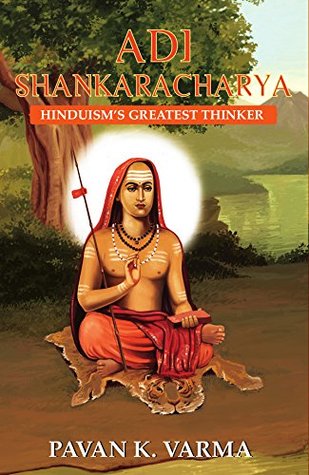More on this book
Community
Kindle Notes & Highlights
Read between
August 20 - October 13, 2019
When religions are largely reduced to rituals, there is always the danger that the form will become more important than the substance.
‘I am neither the earth, nor water, nor fire, nor air, nor sky, nor any other properties. I am not the senses and not even the mind. I am Shiva, the undivided essence of consciousness.’
I am Brahma alone. And, this entire world has been spread out by pure consciousness. All this, without residue, has been superimposed by me through nescience which consists of the three gunas (sattva, rajas and tamas). Thus, he in whom there is firm knowledge in respect of the eternal, blemishless supreme (Brahma) which is unexcellable bliss, is the preceptor, be he a chandala or a brahamana. This is my conclusive view.
That they differ only in name and form, While the stuff of which all are made is clay; As by knowing one gold nugget, dear one, We come to know all things made out of gold: That they differ only in name and form, While the stuff of which all are made is gold; As by knowing one tool of iron, dear one,
one is born, one lives and one dies, and in between there could be joy, but there is also sorrow and grief. There is no redemption from the starkness of this sterile, predictable charade, and all of a sudden the purport of ambition and achievement, of causes and goals, becomes opaque.
This man sees and has no doubts: he surrenders, he is pure and has peace. Work, pleasant or painful, is for him joy. For there is no man on earth who can fully renounce living work, but he who renounces the reward of his work, is in truth a man of renunciation.
When work is done for a reward, the work brings pleasure, or pain, or both, in its time; but when a man does work in Eternity, then Eternity is his reward. 5
Nishkama...
This highlight has been truncated due to consecutive passage length restrictions.
the emphasis was not on what dogmatically is, or what emphatically must be, or what necessarily should be, but what possibly could be.
maybe, it is; maybe, it is not; maybe, it is and is not; maybe, it is inexpressible; maybe, it is and is inexpressible; maybe, it is not and is inexpressible; maybe it is and is not and is inexpressible.
Reading Newton, we have to ask: How can anything ever happen? With the Bohr-Heisenberg interpretation of quantum mechanics, the great problem becomes: How can anything ever be?
Krishna is like a particle that is both a wave and a particle; a particle whose velocity and position can never be accurately measured; and, a particle whose existence can never be directly explained but whose measurable effects are beyond doubt! Krishna is thus a metaphor for why the world is what it is: known, yet beyond complete explication.
As a man who has devoted his whole life to the most clear headed science, to the study of matter, I can tell you as a result of my research about atoms this much: There is no matter as such. All matter originates and exists only by virtue of a force which brings the particle of an atom to vibrate and holds this minute solar system of the atom together. We must assume behind this force the existence of a conscious and intelligent mind. The mind is the matrix of all matter.
The biologist Edwin Chargaff also speaks about this ‘immaterial’, invisible force—which Shankara unhesitatingly calls Brahman. Chargaff writes that if a scientist ‘has not experienced, at least a few times in his life, this cold shudder down his spine, this confrontation with an immense, invisible face whose breath moves him to tears, he is not a scientist.’
‘Through the complete cessation of Egoism, through the stoppage of the diverse mental waves due to it, and through the discrimination of the inner Reality, one realizes that Reality as “I am Thou”—Tat Tvam Asi.’


